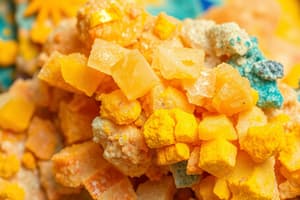Podcast
Questions and Answers
What is the chemical formula for Calcium Sulfate Dihydrate?
What is the chemical formula for Calcium Sulfate Dihydrate?
At what temperature does open calcination of gypsum occur?
At what temperature does open calcination of gypsum occur?
What is the main product of open calcination of gypsum?
What is the main product of open calcination of gypsum?
What type of crystals does Plaster of Paris consist of?
What type of crystals does Plaster of Paris consist of?
Signup and view all the answers
Which process is used to produce Calcium Sulfate Hemihydrate from Calcium Sulfate Dihydrate?
Which process is used to produce Calcium Sulfate Hemihydrate from Calcium Sulfate Dihydrate?
Signup and view all the answers
What is the role of Calcium Chloride in the improved stones process?
What is the role of Calcium Chloride in the improved stones process?
Signup and view all the answers
What is the characteristic of the crystals that make up Plaster of Paris?
What is the characteristic of the crystals that make up Plaster of Paris?
Signup and view all the answers
Which of the following is NOT a characteristic of Plaster of Paris?
Which of the following is NOT a characteristic of Plaster of Paris?
Signup and view all the answers
What temperature is typically used for closed calcination in the production of gypsum?
What temperature is typically used for closed calcination in the production of gypsum?
Signup and view all the answers
What effect does smaller crystals have on gypsum setting time?
What effect does smaller crystals have on gypsum setting time?
Signup and view all the answers
What happens when too much water is added to gypsum powder?
What happens when too much water is added to gypsum powder?
Signup and view all the answers
What is the result of mixing gypsum for too long?
What is the result of mixing gypsum for too long?
Signup and view all the answers
What effect does temperature have on gypsum setting reaction up to 50°C?
What effect does temperature have on gypsum setting reaction up to 50°C?
Signup and view all the answers
What does the equation H2O + CaSO4⋅1⁄2 H2O represent?
What does the equation H2O + CaSO4⋅1⁄2 H2O represent?
Signup and view all the answers
Which type of gypsum has the highest setting expansion?
Which type of gypsum has the highest setting expansion?
Signup and view all the answers
What occurs when gypsum is subjected to a temperature above 100°C?
What occurs when gypsum is subjected to a temperature above 100°C?
Signup and view all the answers
What do accelerators do in gypsum setting?
What do accelerators do in gypsum setting?
Signup and view all the answers
Which of the following affects the strength of gypsum products?
Which of the following affects the strength of gypsum products?
Signup and view all the answers
What happens if the mixing time is too short?
What happens if the mixing time is too short?
Signup and view all the answers
What is the setting time defined as?
What is the setting time defined as?
Signup and view all the answers
What is the effect of a lesser water-to-powder (W/P) ratio?
What is the effect of a lesser water-to-powder (W/P) ratio?
Signup and view all the answers
Which factor generally reduces setting expansion?
Which factor generally reduces setting expansion?
Signup and view all the answers
What is the setting expansion for dental stone with a WP ratio of .28 - .30?
What is the setting expansion for dental stone with a WP ratio of .28 - .30?
Signup and view all the answers
How does increased spatulation affect setting time?
How does increased spatulation affect setting time?
Signup and view all the answers
Which type of plaster has the highest compressive strength?
Which type of plaster has the highest compressive strength?
Signup and view all the answers
What effect does higher water-to-powder ratio typically have?
What effect does higher water-to-powder ratio typically have?
Signup and view all the answers
Which setting expansion is associated with high-strength dental stone?
Which setting expansion is associated with high-strength dental stone?
Signup and view all the answers
What happens to the crystals when chemical modifiers are used?
What happens to the crystals when chemical modifiers are used?
Signup and view all the answers
Which characteristic is NOT affected by the water-to-powder ratio?
Which characteristic is NOT affected by the water-to-powder ratio?
Signup and view all the answers
What effect does a greater water-to-powder (W/P) ratio have on the strength of a cast?
What effect does a greater water-to-powder (W/P) ratio have on the strength of a cast?
Signup and view all the answers
Which of the following is a property of a good cast?
Which of the following is a property of a good cast?
Signup and view all the answers
What happens if spatulation time exceeds one minute?
What happens if spatulation time exceeds one minute?
Signup and view all the answers
What type of disinfecting solution is recommended for casts?
What type of disinfecting solution is recommended for casts?
Signup and view all the answers
Which of the following statements about dry strength is true?
Which of the following statements about dry strength is true?
Signup and view all the answers
Which aspect is not associated with a good cast?
Which aspect is not associated with a good cast?
Signup and view all the answers
What happens to gypsum products when they expand during setting in water?
What happens to gypsum products when they expand during setting in water?
Signup and view all the answers
Which compound is considered the best accelerator at concentrations greater than 2%?
Which compound is considered the best accelerator at concentrations greater than 2%?
Signup and view all the answers
What effect do retarders typically have on gypsum products?
What effect do retarders typically have on gypsum products?
Signup and view all the answers
How is the strength of gypsum products characterized?
How is the strength of gypsum products characterized?
Signup and view all the answers
Which property is twice in wet strength compared to dry strength after 24 hours?
Which property is twice in wet strength compared to dry strength after 24 hours?
Signup and view all the answers
What should be used to store gypsum products to prolong their shelf-life?
What should be used to store gypsum products to prolong their shelf-life?
Signup and view all the answers
Which of the following options correlates with increased strength in gypsum products?
Which of the following options correlates with increased strength in gypsum products?
Signup and view all the answers
What is the effect of higher concentrations of NaCl and Na2SO4 on gypsum products?
What is the effect of higher concentrations of NaCl and Na2SO4 on gypsum products?
Signup and view all the answers
Which of the following is a recommended practice before getting powder from a gypsum product bottle?
Which of the following is a recommended practice before getting powder from a gypsum product bottle?
Signup and view all the answers
Which type of gypsum product has the highest compressive strength?
Which type of gypsum product has the highest compressive strength?
Signup and view all the answers
Study Notes
Gypsum Overview
- Gypsum is chemically known as Calcium Sulfate Dihydrate (CaSO4·2H2O).
- Commonly used in dental applications, with purity levels approaching 100%.
- Produced through calcination, which involves heating gypsum to change its physical properties.
Calcination Processes
-
Open Calcination: Conducted at temperatures of 110-120°C in a kettle or open bath.
- Produces β-hemihydrate, also known as Plaster of Paris.
-
Closed Calcination: Achieves a chemical reaction transforming gypsum into calcium sulfate hemihydrate.
- Reaction: CaSO4·2H2O → CaSO4·½H2O + 1½ H2O.
Gypsum Products and Their Properties
-
Types of gypsum products:
- Impression Plaster: WP Ratio 0.50-0.75; Strength 290-870 psi; Setting expansion 0-0.15%.
- Plaster of Paris: WP Ratio 0.45-0.50; Strength 1300 psi; Setting expansion 0-0.30%.
- Dental Stone: WP Ratio 0.28-0.30; Strength 3000 psi; Setting expansion 0-0.20%.
- Die Stone: WP Ratio 0.22-0.24; Strength 5000 psi; Setting expansion 0-0.10%.
- High Strength Dental Stone: WP Ratio 0.18-0.22; Strength 7000 psi; Setting expansion 0-0.30%.
Setting Characteristics
- The setting time is measured from mixing to hardening.
- Influenced by water/powder (W/P) ratio: more water leads to longer setting time; less water shortens it.
- Factors affecting setting and expansion include:
- W/P Ratio: Higher ratios increase setting expansion.
- Spatulation: Increased mixing time may reduce setting time.
- Chemical Modifiers: Modifiers typically reduce expansion and improve strength.
Setting Reactions
-
Typical Chemical Equation:
- H2O + CaSO4·½H2O → CaSO4·2H2O + Heat.
-
Accelerators and retarders influence setting speed:
- Accelerators (e.g., K2SO4) decrease setting time.
- Retarders (e.g., Borax) increase the setting time.
Strength and Hardness
- Measured in compressive strength:
- Laboratory Plaster: 27.5 MPa (4000 PSI).
- Dental Stone: 62 MPa (9000 PSI).
- Die Stone: 79 MPa (11500 PSI).
- Strength quality is affected by factors such as W/P ratio, spatulation, and the presence of chemical modifiers.
Handling Gypsum Products
- Store in airtight containers to extend shelf life.
- Proper W/P ratio is crucial to avoid issues like air bubbles or incomplete mixing.
- Care guidelines:
- Shake the container before dispensing powder.
- Use dry scoops to avoid moisture contamination.
Properties of a Good Cast
- High strength and hardness to prevent fractures.
- Accurate measurements necessary for stable setting expansions.
- Should be compatible with impression materials and provide good color contrast.
Disinfection of Casts
- Disinfect casts using an immersion method in a 1:10 sodium hypochlorite solution for 30 minutes.
- In clinical settings, models from non-disinfected impressions should be aseptically wrapped and sterilized.
Studying That Suits You
Use AI to generate personalized quizzes and flashcards to suit your learning preferences.
Description
This quiz explores the chemical properties of gypsum, including its formulation and various calcination processes. You will learn about different gypsum products used in dental applications, their characteristics, and their specific ratios. Test your knowledge on gypsum's importance in various industrial applications.




